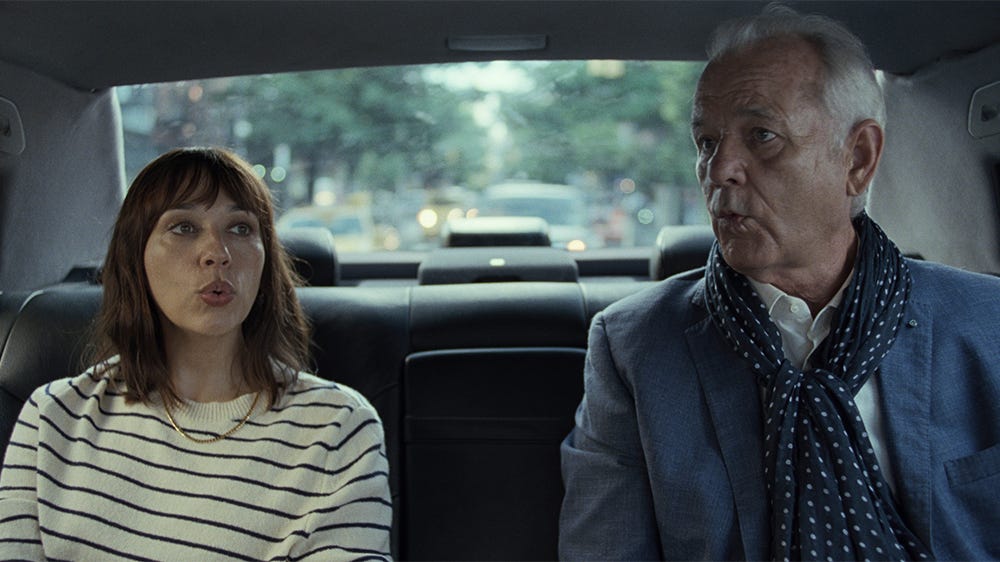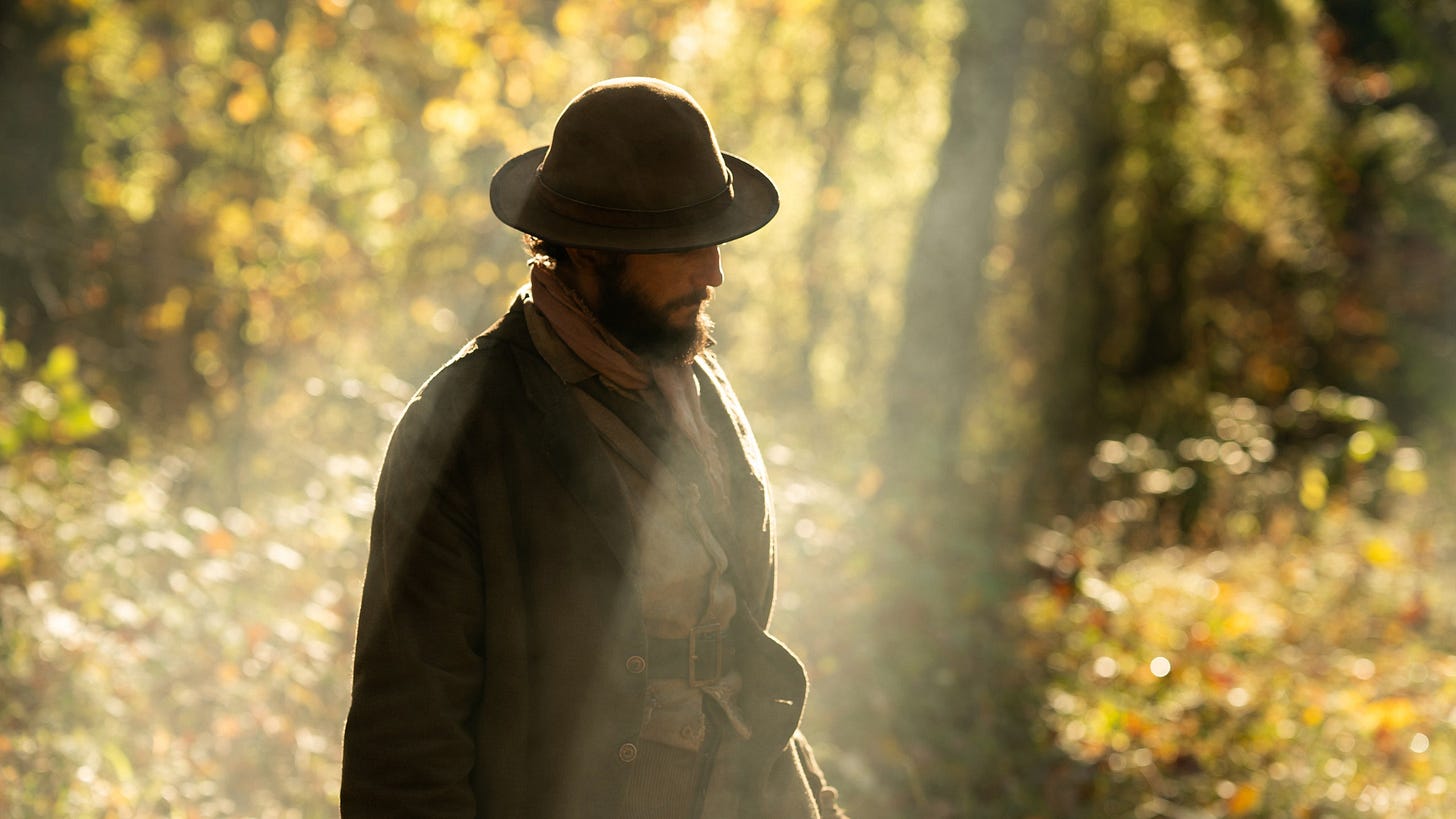Like every other ardent film lover, I missed going to the movies in 2020. But even more so, I missed seeing the people and having the conversations normally associated with those experiences. One of the main reasons I started this newsletter was to bridge that suddenly depressing divide.
If you’ve spent any lengthy amount of time with me you know that I’m at my happiest professionally talking shop. 2020 stripped me of those opportunities almost completely. No more daily lunches with my colleagues at Pacific Arts Movement. No random weekend trips to Los Angeles to see my cinephile friends. No more pre-press screening chats with my fellow members of the San Diego Film Critics Society. It was a profound experiential loss that I’ve had a hard time expressing to those who love me the most.
With any “Best Of” piece one tries to sum up the past year from some kind of creative vantage point. But that feels like a futile exercise considering everything that has happened, all of the lives that were lost to COVID-19 and those that continue to be impacted by racial injustice, poverty, and social inequity. Still, I believe this terrible year did provide us with plenty of very good films, even a few great ones, at least for those who were curious enough to seek them out. And I’d like to celebrate them in kind. So this is me looking back in praise of those bright spots that helped me get through a period of isolation and disenchantment, as all great works of art tend to do.
First, my HMs in alphabetical order:
Alone (dir. John Hyams), Fourteen (dir. Dan Sallitt), I Was at Home, But… (dir. Angela Schanelec), Martin Eden (dir. Pietro Marcello), News of the World (dir. Paul Greengrass), Sorry We Missed You (dir. Ken Loach), The Assistant (dir. Kitty Green), The Invisible Man (dir. Leigh Whannell), The Whistlers (dir. Corneliu Porumboiu), To the Ends of the Earth (dir. Kiyoshi Kurosawa)
On the Rocks (dir. Sofia Coppola)
I spent most of 2020 looking after my two-year-old daughter. It was an amazing, maddening, frustrating, hilarious, and illuminating experience. So watching Sofia Coppola’s lovely cinematic spritzer about a writer (Rashida Jones) who gets caught up in a fun NYC web of low-key paranoia spun by her charismatic art dealer father (Bill Murray) hit home in a way that I could have never imagined. In many ways, this feels like the director’s most personal film, addressing very specifically what it feels like to share the same room (and DNA) with a man who tries to dominate every conversation (and woman). Murray and Jones are lovely dance partners, and their melancholic tango reminded me to never take a shared experience for granted. Even as I write this now my little girl is clinging to my leg. (Apple TV+)
9. Driveways (dir. Andrew Ahn)
I’ve been lucky enough to spend some time with Andrew in real life, and he’s one of the most generous, kindest people you’ll ever meet. His latest film is a flickering testament to those traits. The setup could have been a disaster in any one else’s hands: a young Asian American boy (Lucas Jaye) and his grieving mother (Hong Chau) meet an aging Korean War vet (Brian Dennehy) while cleaning out the house of a recently deceased relative in small town America. Instead of embracing the partisanship and easy stereotyping of our current moment, Ahn’s beautiful drama relishes in the smaller moments and conversations that bring people closer to understanding each other slowly over time. And Dennehy’s climactic monologue (in what would be his final performance) quietly expresses a lifetime of longing within the context of newfound hope and friendship. (Film Rise) (iTunes).
8. Dear Comrades! (dir. Andrei Konchalovsky)
An excerpt from my review of this harrowing gem at The Film Stage. You have one more day to view it on Film Forum’s virtual screening platform!
The gears of oppressive government bureaucracy are designed to crush homegrown opposition before it becomes too threatening. In that sense, institutions and policies put in place by Hitler’s Third Reich and Trump’s MAGA cult have a lot in common with those of 20th century Communist Russia, an ideological rope-a-dope that publicly posited figureheads like Stalin and later Khrushchev as warriors of the people while privately undermining any citizen-led resistance with brutal force. Andrei Konchalovsky’s great new film Dear Comrades! depicts such a response with the sobering understanding that historical events of any magnitude can be easily manipulated to match the motivations of those in power. Subverting these efforts means highlighting the prickly nuances of human experience under duress (panic, regret, pain), and finding a sense of shared empathy in the images themselves. Shot in Academy ratio and striking black-and-white, the film becomes a detailed cinematic record of how compromise, ego, cowardice, and greed can rapidly lead to a state-sanctioned massacre. (Neon)
7. Nomadland (dir. Chloé Zhao)
My thoughts on this one from a recent Afterlgow post:
True grit Americana put to the test. A mostly interior performance from the great Francis McDormand. She plays Fern, a widow who experiences a late-stage restlessness that’s a kind of rebellion against the jobs and houses and marriages society expects women to embrace. Zhao’s film is experimentally patient, replacing the expectations of family and love with the rhythms of quiet isolation and momentary, memorable camaraderie. So many films try to place the viewer in a box to entertain or challenge us, but Zhao gives us an open world America where the road and terrain do all the talking. Fern refuses to accept standard definitions of home, especially when this construct has always been defined by someone else, their vision, their bed, their desires. Often, western (and Western) cinema conflates the death of a town and husband with tragedy, but here it means an opening for one woman to see the country, and in turn, see herself. (Searchlight Pictures)
6. Fire Will Come (dir. Oliver Laxe)
And it does, eventually. But before that apocalyptic scene, recently released ex-con and notorious arsonist Amador (Amador Arias) tries to reintegrate himself into a casually unwelcome community high atop the Corsican mountains of Northern Spain. The process is painstakingly protracted and slyly dehumanizing, laying the groundwork for an epic finale worthy of the great American Westerns. Laxe’s film creates an unmistakable tension out of the central character’s repressed anger toward a society that only understands the language of embers and smoke. It might be the quietest film about rage I’ve ever seen. (KimStim)
5. Time (dir. Garrett Bradley)
A stunner. From my latest Afterglow post:
Two decades gone, but not a second wasted or forgotten. It’s not just about the years, but the toll and the work. An all timer that gracefully confronts the unimaginable pain of prolonged separation at the hands of a compromised justice system. Endurance, belief, anger all channelled into the pursuit of freedom. The last ten minutes had me crying hysterically. (Amazon)
4. Da 5 Bloods (dir. Spike Lee)
Many will rightfully praise his turn in Ma Rainey’s Black Bottom as Chadwick Boseman’s career-defining capstone. But I’d wager his performance as Stormin’ Norman, this brilliant film’s heart, soul, and conscious, is even more crucial. Every time he’s on screen the movie turns electric, connecting history through lighting image flashes and thunderous words. Here’s something I wrote about the film earlier in the year, and I think it captures how I still feel about it, and what Boseman’s character comes to personify.
Throughout Da 5 Bloods, Lee cuts away to archival photographs of important Black historical figures (everyone from Crispus Attacks to Milton L. Olive, III) whose actions are paramount to understanding the complex ways in which America’s legacy has been shaped by multitudes of Black experiences. In that sense, the film offers a sharp but effective critique of almost every Vietnam War film that has ignored these stories, even going so far as to use Wagner’s “Ride of the Valkyries” for a peaceful boat ride into the supposed “Heart of Darkness.” Fuck you, Francis Ford Coppola! (Netflix)
3. Undine (dir. Christian Petzold)
My favorite living filmmaker delivers another masterpiece two years running. Here’s the capsule I wrote for The Film Stage’s Best 50 Films of 2020.
Outside Johnnie To, I’d be hard-pressed to name someone who more thoroughly embraces the mysteries of genre than German filmmaker Christian Petzold. After reconfiguring the wartime melodrama in Transit, he imbues the magical-realist romance with both tenderness and melancholy in this strangely beautiful love story about an architectural historian (Paula Beer) who develops amour fou with a professional diver (Franz Rogowski). Their intense courtship is a mutual submersion into the murky depths of passion and longing, where one moment can bring swooning bliss, the next terrible tragedy. More than anything, it is an essential portrait of cinematic and romantic malleability, and further proof that nobody makes films like Petzold. (IFC)
2. The Cordillera of Dreams (dir. Patricio Guzmán)
I’m genuinely shocked that more critics haven’t placed this on their list. In my mind it’s the equal of Nostalgia for the Light. If you aren’t familiar with Guzmán’s work, here’s a link on where to stream all of his docs. Below is the capsule I wrote for The Film Stage’s Best 50 Films of 2020. This is an incredible movie.
Having experienced the authoritarian traumas of 20th-century Chile firsthand, documentarian Patricio Guzmán makes films that explore the grieving process at both a personal and national level. His latest masterpiece, the third part of a trilogy that includes Nostalgia for the Light and The Pearl Button, expands this scope to an elemental level. Through the most sublime stylistic means, it positions the Andes mountain range as an organic witness to the reign of terror that has transpired, and a reminder of the enduring hope that lies ahead. (Icarus Films)
1. First Cow (dir. Kelly Reichardt)
One of the last films I saw in a movie theater, and I’m so thankful for that experience. And fittingly, the first film I covered in this newsletter. It’s a story of survival amid economic hardship, innovation in the face of capitalist conformity, and intimate friendship in spite of societal oppressions, which feels like the ultimate 2020 movie to me. And for me, it was. Here’s an excerpt from that post from way back in March.
Nobody depicts the American wilderness quite like Kelly Reichardt. Hell, nobody depicts the American experience quite like Kelly Reichardt. In our modern-day release swirl of superhero sagas, elevated horror, and Oscar hype machines, her patient and thoughtful perspective on the world feels even more necessary. Reichardt’s films almost always deal with the theme of survival, and more specifically how times of collective transition become quietly unflinching and potentially devastating for people who no longer have a place to call home. She’s fascinated by what motivates these wayward souls to press on and endure inescapable patterns of financial hardship, emotional malaise, and ideological frustration despite societal indifference. Sensing that the stress and anxiety of modern life could potentially consume all hope, her yearning, loving camera looks to nature for solace, and a chance to calm one’s mind in times of distress… (A24) (Amazon)














